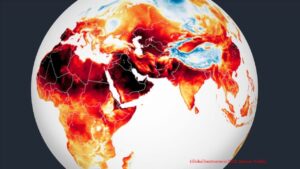
Since late June 2019, Europe are experiencing extreme heat. Spain, France and Italy have suffered through several intense heatwaves, with temperatures exceeding 40.0°C in many areas. The highest ever temperature was recorded in France at 46.0°C.
The heatwaves in Spain have also trigged the biggest wildfires in 20 years. Other countries such as Germany, Poland and the Czech Republic also saw highest ever temperatures in their local climate history.
In the U.S., tens of millions of people were also under heat alerts as temperatures in cities such as New York City and Little Rock rocketed above 100 °F or 37.8 °C.
Scientists said that it was a brutally hot summer around the globe. Climate data indicate that July 2019 is the hottest month since records began in 1880 and probably the hottest ever month on record for the Earth. According to NOAA, 2019 is almost certain to end up as one of the three warmest years on record, following 2016 and 2017.
So far, relevant data have indicated that all but one of the 10 warmest years on record were occurred after 2005. If taking the year of 2019 into account, maybe we could state soon that all the 10 warmest years on record are occurred after 2005.
Scientific studies suggest that recent trend of climate warming is ‘unprecedented’ over the last 2,000 years, and that global warming seems to be speeding up.
Two recent studies published in Nature and Nature Geoscience show that a warming period is now affecting the whole planet at the same time for the first time, and that the speed of global warming has never been as high as it is today. Climate warming has been evident so far for more than 98 percent of the earth surface.
Although it has been proven that it was extraordinarily cool in Europe for several centuries during the “Little Ice Age” (approx. 1300 — 1850) and the “Medieval Warm Period” (approx. 700 — 1400), an international research team led by Dr. Raphael Neukom from the University of Bern has confirmed that there is no evidence that there were uniform warm and cold periods across the globe over the pre-industrial 2,000 years. Instead, climate fluctuations in the past varied from region to region.

Dr. Neukom explains that “it’s true that it was generally colder across the whole world during the Little Ice Age, but not everywhere at the same time. The peak periods of pre-industrial warm and cold periods occurred at different times in different places.” That is to say, “regional climates in pre-industrial times were primarily influenced by random fluctuations within the climate systems themselves.”
According to the studies, external factors such as solar activity or volcanic eruptions were not intense enough to cause markedly warm or cold temperatures across the whole world for decades or even centuries. So, modern climate change cannot be explained by random fluctuations but by anthropogenic emissions of CO2 and other greenhouse gases.
If the anthropogenic emissions of greenhouse gases cannot be substantially reduced, there would be more intolerable heatwaves across the global year after year.
References:
- Neukom, R., Steiger, Nathan, Gómez-Navarro, J. J., Wang, J., & Werner, J. P. No evidence for globally coherent warm and cold periods over the pre-industrial Common Era. Nature, 2019 DOI: 1038/s41586-019-1401-2
- PAGES 2k Consortium. Consistent multidecadal variability in global temperature reconstructions and simulations over the Common Era. Nature Geoscience, 2019 DOI: 1038/s41561-019-0400-0



Leave a Reply